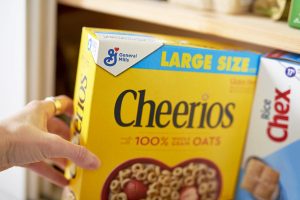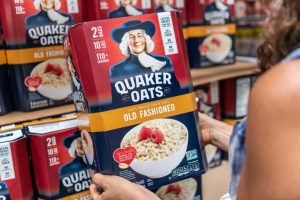80% of Americans tested were found to have been exposed to chlormequat, which has been linked to issues with puberty and reproduction, a study claims

- Chlormequat — a chemical that’s been linked to reproductive and fertility issues in animal tests — has been found in oat-based products like Cheerios and Quaker Oats.
- The chemical has been banned for use on edible plants in the United States, but in 2018, the Environmental Protection Agency began allowing plants treated with chlormequat to be imported.
- “All our products adhere to all regulatory requirements,” said Mollie Wulff, a spokesperson for General Mills, which manufactures Cheerios.
A chemical that’s banned for use on edible plants in the United States has been found in Cheerios and Quaker Oats — and 80% of Americans have been exposed to it, according to a new study in Journal of Exposure Science & Environmental Epidemiology and shared on Nature.
Chlormequat is a chloride salt, according to the National Library of Medicine, and is “registered for use on ornamental plants grown in greenhouses and nurseries.”
However, it’s approved for use on edible plants in other countries — and in 2018, the Environmental Protection Agency allowed the importation of plants that had been treated with the chemical, the Environmental Working Group reports.
“All our products adhere to all regulatory requirements,” said Mollie Wulff, a spokesperson for General Mills, which manufactures Cheerios. “Food safety is always our top priority at General Mills, and we take care to ensure our food is prepared and packaged in the safest way possible.”
Quaker Foods has not responded to PEOPLE’s request for comment.

In animal studies published by the National Library of Medicine, chlormequat has been linked to reduced fertility and “reproduction problems,” delayed puberty, and impacted embryonic growth and “even has adverse effects on postnatal health.”
“We detected the chemical in 92 percent of oat-based foods purchased in May 2023, including Quaker Oats and Cheerios,” a report from the EWG on the study says.
The list included regular Cheerios, Honey Nut Cheerios, Cheerios Oat Crunch Oats n’ Honey, and Frosted Cheerios.
Quaker Old Fashioned Oats, Quaker Instant Oatmeal Maple & Brown Sugar, and oat-based bars like Quaker Chewy Dark Chocolate Chunk also contained the chemical.
Both brands are popular with children, with Cheerios saying they’re “considered a favorite first finger food by moms.” Quaker says “Oats are great for toddlers and young kids being introduced to solid foods” on its site.

The study also found the chemical in 80% of the urine of those tested — and since chlormequat leaves the body in about 24 hours, the EWG says “these findings also suggest regular exposure.”
In 2018, the companies responded to a report that found glyphosate, a controversial weed-killing pesticide that’s been linked to cancer, in their oat-based products.
“Our products are safe and without question they meet regulatory safety levels,” General Mills said in a statement to Fast Company at the time.
“The EPA has researched this issue and has set rules that we follow as do farmers who grow crops including wheat and oats. We continue to work closely with farmers, our suppliers and conservation organizations to minimize the use of pesticides on the crops and ingredients we use in our foods.”
Quaker Oats also responded to the claims at the time, saying that they “proudly stand by the safety and quality” of its products, adding that they “do not add glyphosate during any part of the milling process.”
By Cara Lynn Schutz
Published by People
Republished by The 21st Century
The views expressed in this article are solely those of the author and do not necessarily reflect the opinions of 21cir.com.
